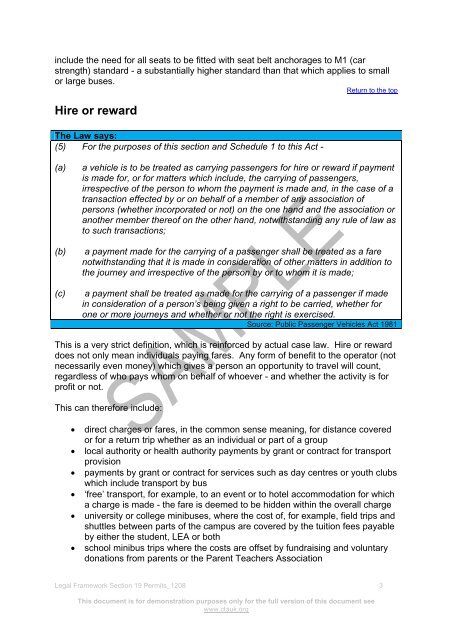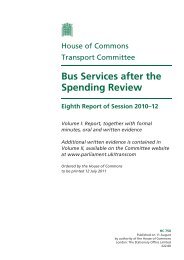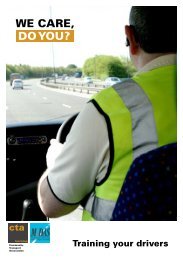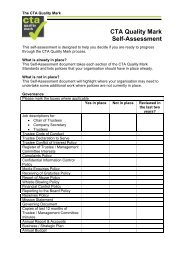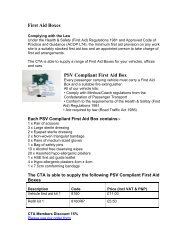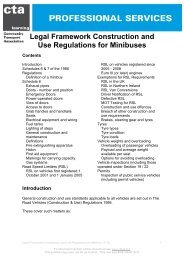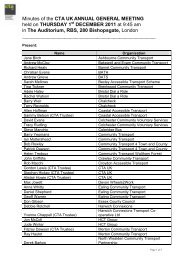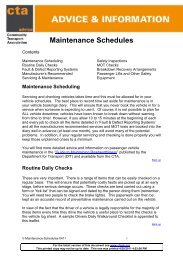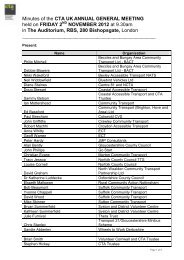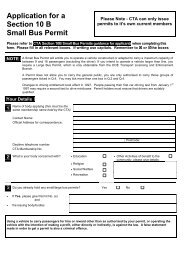Legal Framework Section 19 Minibus Permits - Community ...
Legal Framework Section 19 Minibus Permits - Community ...
Legal Framework Section 19 Minibus Permits - Community ...
You also want an ePaper? Increase the reach of your titles
YUMPU automatically turns print PDFs into web optimized ePapers that Google loves.
include the need for all seats to be fitted with seat belt anchorages to M1 (car<br />
strength) standard - a substantially higher standard than that which applies to small<br />
or large buses.<br />
Return to the top<br />
Hire or reward<br />
The Law says:<br />
(5) For the purposes of this section and Schedule 1 to this Act -<br />
(a)<br />
(b)<br />
(c)<br />
a vehicle is to be treated as carrying passengers for hire or reward if payment<br />
is made for, or for matters which include, the carrying of passengers,<br />
irrespective of the person to whom the payment is made and, in the case of a<br />
transaction effected by or on behalf of a member of any association of<br />
persons (whether incorporated or not) on the one hand and the association or<br />
another member thereof on the other hand, notwithstanding any rule of law as<br />
to such transactions;<br />
a payment made for the carrying of a passenger shall be treated as a fare<br />
notwithstanding that it is made in consideration of other matters in addition to<br />
the journey and irrespective of the person by or to whom it is made;<br />
a payment shall be treated as made for the carrying of a passenger if made<br />
in consideration of a person’s being given a right to be carried, whether for<br />
one or more journeys and whether or not the right is exercised.<br />
Source: Public Passenger Vehicles Act <strong>19</strong>81<br />
This is a very strict definition, which is reinforced by actual case law. Hire or reward<br />
does not only mean individuals paying fares. Any form of benefit to the operator (not<br />
necessarily even money) which gives a person an opportunity to travel will count,<br />
regardless of who pays whom on behalf of whoever - and whether the activity is for<br />
profit or not.<br />
This can therefore include:<br />
• direct charges or fares, in the common sense meaning, for distance covered<br />
or for a return trip whether as an individual or part of a group<br />
• local authority or health authority payments by grant or contract for transport<br />
provision<br />
• payments by grant or contract for services such as day centres or youth clubs<br />
which include transport by bus<br />
• ‘free’ transport, for example, to an event or to hotel accommodation for which<br />
a charge is made - the fare is deemed to be hidden within the overall charge<br />
• university or college minibuses, where the cost of, for example, field trips and<br />
shuttles between parts of the campus are covered by the tuition fees payable<br />
by either the student, LEA or both<br />
• school minibus trips where the costs are offset by fundraising and voluntary<br />
donations from parents or the Parent Teachers Association<br />
<strong>Legal</strong> <strong>Framework</strong> <strong>Section</strong> <strong>19</strong> <strong>Permits</strong>_1208 3<br />
This document is for demonstration purposes only for the full version of this document see<br />
www.ctauk.org


